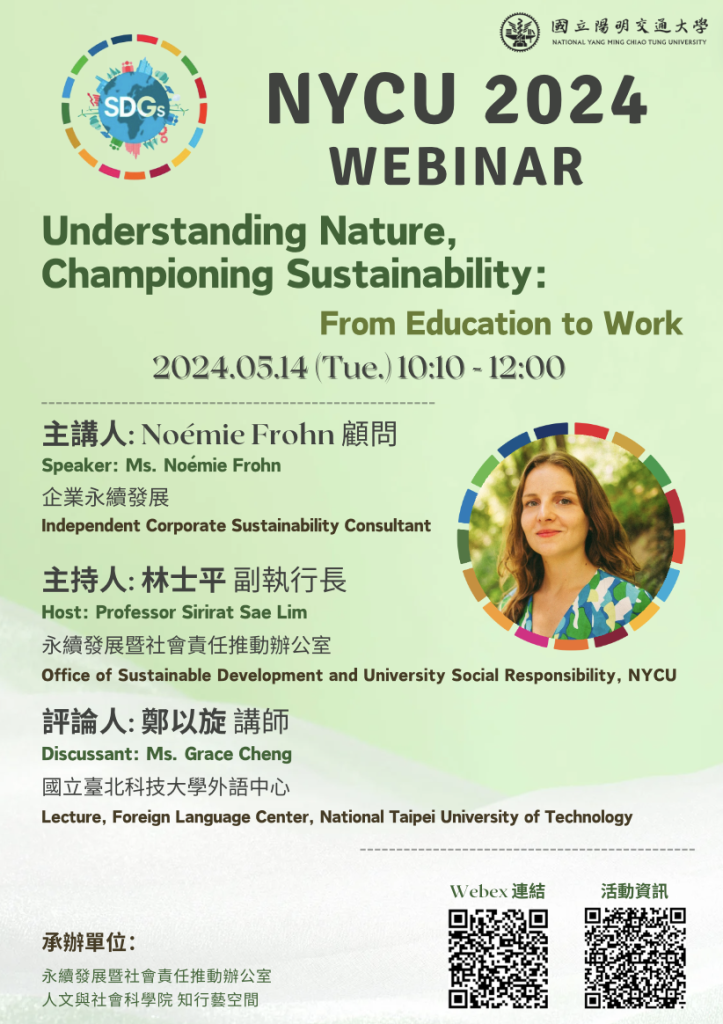技術監管:科技業在全球供應鏈中的商業與人權保障
Regulating Tech: Business and Human Rights for Technology Value Chains
- 主講人:Dr. Lisa Hsin(牛津大學法學院企業與人權研究員、牛津大學科珀斯克里斯蒂學院 初級研究員、新加坡國立大學 兼任研究員)
- Speaker: Dr. Lisa Hsin (Research Fellow in Business and Human Rights, Law Faculty, University of Oxford; Junior Research Fellow, Corpus Christi College, University of Oxford; Adjunct Research Fellow, National University of Singapore)
- 主持人:凌怡華博士(Work Better Innovations執行董事、英國諾丁漢大學高級研究員)、邱羽凡副教授(國立陽明交通大學科技法律研究所)
- Moderators: Dr. Bonny Ling (Executive Director, Work Better Innovations; Senior Non-resident Fellow, University of Nottingham Taiwan Studies Programme; Research Fellow, Institute for Human Rights and Business) & Assoc. Prof. Yu-Fan Chiu (School of Law, NYCU)
- 時間:2023年5月3日19:00-21:00(臺北時間)
- Date & Time: May 3 2023 (Wednesday), 19:00-21:00 (TAIPEI TIME, GMT+8)
- 活動地點:Webex線上會議室
- Location: video conference via Webex
- Webex連線網址 / Webex Link:https://nctulaw.webex.com/nctulaw-tc/j.php?MTID=mcc3acfeb2195527812b7ae00b98e098d
- 報名網址/ Registration link:https://reurl.cc/b7anll (亦可掃海報左下方的QR code)
- 語言:英文,提供中文翻譯 Language: Lecture in English (Mandarin Interpretation provided)
- 主辦單位:國立陽明交通大學文化研究國際中心、國立陽明交通大學科技法律研究所、台聯大文化研究國際中心、台聯大系統亞際文化研究國際碩士學位學程
演講簡介:科技的進步雖促進人們聯繫與溝通、提高人們工作效率,並成為現代生活不可或缺的部分,但多數人卻未察覺科技可能產生的負面影響,有鑑於科技產業影響力與日俱增,在當前各國推動ESG 的永續發展下,社會應更加著重其企業責任,然而企業責任的內涵是什麼?為什麼科技業的公司有遵循企業責任的必要?在科技業的全球供應鏈中,硬體中鋰電池主要依賴產自於剛果的鈷礦,但鈷礦開採產業卻造成剛果惡劣的工作條件和童工問題,而蘋果、三星、索尼等公司亦間接參與在此暴行。在數位空間的領域,VPN服務的目的在於保護隱私,卻同時使犯罪份子可以透過社交媒體鎖定被害人,而不留下犯罪痕跡以利其隱藏身份。在當前的經濟全球化下,科技公司對監管產生新的挑戰,人們應摒除科技公司只提供「產品和服務」的觀念,並正視其營運如基礎設施一樣重要,雖成為人們的生活基礎,卻可能同時造成傷害。2011 年的聯合國工商企業與人權指導原則 (UNGPs) 要求國家和企業應進行立法和採取盡職調查的標準,UNGPs並特別要求國家採用「智慧組合」(smart mix)的策略。本演講將由Dr. Lisa Hsin就其在聯合國人權事務高級專員辦事處下的 B-Tech 所進行的研究,提出分析。
Abstract: Technology is amazing. It helps us stay connected, work more efficiently and experience things beyond our imagination. Technology has become an integral part of modern life, but the positive aspects of technology hides a dark underbelly. Most of us are unaware of the unseen harm. But given the power and influence of technology companies, we must pay more attention. So, what is the responsibility of businesses? Why do they need to care?In hardware, lithium batteries rely on cobalt, a mineral sourced almost exclusively from the Congo. There, researchers discovered horrific working conditions, and extreme forms of child labour. Companies such as Apple, Samsung, and Sony etc are complicit in the abuse. In the digital space, VPN services, designed to protect privacy can also hide the identity of criminals intent on harm. Vulnerable people are targeted and recruited via social media forums by criminals without leaving a trace.
This presentation canvases the work that Dr Hsin recently undertook for B-Tech, a project under the auspice of UN Office of the High Commissioner of Human Rights. The research we jointly conducted suggested that technology companies present new challenges to regulation; but it requires a move away from the idea that they only provide ‘products and services’, instead, to confront the reality is that their operations are like infrastructure, as essential to us as roads, telephone lines and plumbing. They make up the fabric of our lives, but they can also control and cause harm.
The UN Guiding Principles on Business and Human Rights 2011 (UNGPs) require States and corporations to adopt legislation and standards of due diligence. In particular, the UNGPs require states to deploy a ‘smart mix’ of strategies and new regulation is just one option of many in a toolbox of techniques along with a rethinking of existing law.
主講人簡介:Dr Lisa Hsin目前擔任牛津大學法學院的企業與人權研究員,並同時為科珀斯克里斯蒂(Corpus Christi)學院的初級研究員和新加坡國立大學EW Barker法律與企業中心的兼任研究員。2020年在與英國國際法與比較法學院帶領一項有關企業執法機制的比較之共同研究計畫,該研究計畫並由英國研究創新局、重點策略基金和現代奴隸和人權政策和證據中心所資助。2022年Dr Lisa Hsin向聯合國人權事務高級專員辦事處的企業與人權單位提供針對科技部門的監管措施的建議。
Bio: Dr Lisa Hsin is a Research Fellow in Business and Human Rights at the Law Faculty of the University of Oxford. She concurrently holds a teaching post as Junior Research Fellow of Corpus Christi College, and Adjunct Research Fellow of the EW Barker Centre for Law and Business, National University of Singapore. She obtained her DPhil at the University of Oxford, her LLM from the University of California, Berkeley and BA/LLB(Hons) from the University of Auckland. Before academia, Lisa was an associate at Freshfields Bruckhaus Deringer in London specialising in commercial dispute resolution and corporate investigations. She is a qualified Barrister and Solicitor in New Zealand, and a Solicitor with Higher Rights of Audience in England and Wales.
Lisa has written on issues relating to corporate regulation and corporate compliance in the context of business and human rights. In 2020, Lisa led a joint research project with the British Institute of International and Comparative Law funded by the UK Research and Innovation Strategic Priorities Fund and the Modern Slavery Policy and Evidence on the effectiveness of the Modern Slavery Act 2015, including a comparison of corporate enforcement mechanisms. In 2022, Lisa advised the Business and Human Rights Unit of the UN Office of the High Commissioner for Human Rights on regulatory initiatives relating to the technology sector. Lisa’ work is empirically informed, with a focus on the intersection of legal regimes as barriers or mechanisms to improving corporate accountability.







